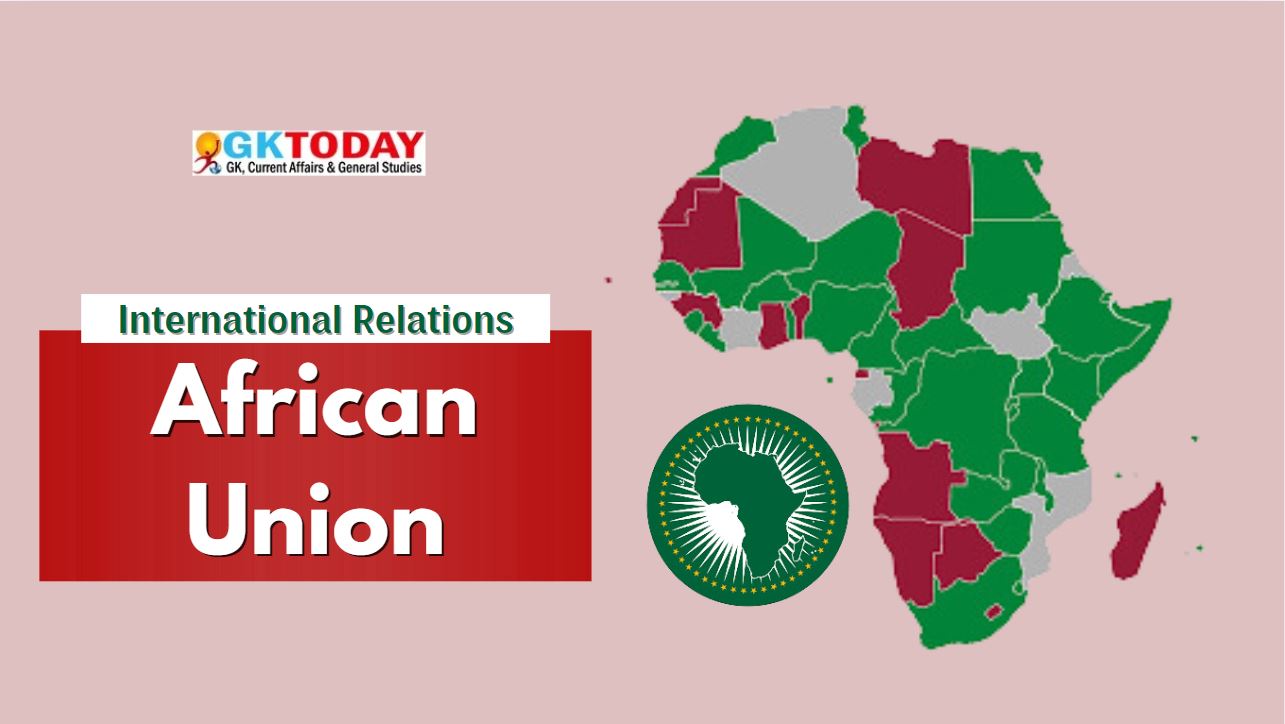International Relations – African Union Study Notes
The African Union (AU) is a continental organisation that aims to promote unity, peace, and development across Africa. Established on July 26, 2001, and officially launched a year later, the AU succeeded the Organisation of African Unity (OAU). Its headquarters are located in Addis Ababa, Ethiopia. The AU plays a vital role in addressing the continent’s challenges, including political instability, economic dependency, and human rights issues.
Objectives of the African Union
The AU has several key objectives:
- Promote unity and solidarity among African states.
- Coordinate and intensify cooperation for development.
- Safeguard the sovereignty and territorial integrity of member states.
- Promote peace, security, and stability on the continent.
- Encourage democratic governance and human rights.
These objectives guide the AU’s policies and initiatives, aiming to create a prosperous and peaceful Africa.
Membership
As of 2024, the AU has 55 member states. All African countries are members except Morocco, which rejoined in 2017 after leaving in 1984. The diverse membership reflects the continent’s rich cultural and political landscape.
Structure of the African Union
The AU is structured into several key components:
- Assembly: Composed of Heads of State and Government; it is the supreme decision-making body.
- Executive Council: Consists of Ministers or Authorities designated by member states’ governments.
- Commission: The AU’s secretariat, led by a Chairperson and Deputy Chairperson.
- Pan-African Parliament: Promotes human rights and democratic principles.
- Court of Justice: Ensures adherence to the African Charter on Human and Peoples’ Rights.
This structure allows the AU to function effectively and address various issues across the continent.
Key Organs and Institutions
The AU comprises several critical organs and institutions:
- Peace and Security Council (PSC): Responsible for maintaining peace and security.
- African Union Commission (AUC): The administrative branch that implements policies and decisions.
- African Peer Review Mechanism (APRM): Promotes good governance and accountability.
- African Development Bank (AfDB): A financial institution focused on economic development.
These organs work collaboratively to achieve the AU’s objectives.
Key Policies and Initiatives
The AU has introduced several policies and initiatives:
- Agenda 2063: A strategic framework for the socio-economic transformation of Africa.
- Silencing the Guns: An initiative aimed at ending conflicts by 2020 (ongoing).
- African Continental Free Trade Area (AfCFTA): Aims to create a single market for goods and services.
These initiatives are designed to encourage economic growth and stability across the continent.
Peace and Security
The AU plays important role in maintaining peace and security:
- Intervention in Conflicts: The AU has authorised peacekeeping missions in Sudan (Darfur), Somalia, and the Central African Republic.
- African Standby Force (ASF): A regional force for rapid deployment in crisis situations.
These efforts demonstrate the AU’s commitment to addressing conflicts and promoting stability.
Human Rights and Governance
The AU is dedicated to human rights protection and governance:
- African Charter on Human and Peoples’ Rights: A framework for safeguarding human rights.
- Promotion of Democracy: Support for electoral processes and democratic governance.
These initiatives aim to enhance political stability and respect for human rights across Africa.
Challenges Faced by the African Union
Despite its efforts, the AU faces several challenges:
- Political Instability: Ongoing conflicts in regions such as the Sahel and Horn of Africa.
- Economic Dependency: Reliance on external funding and investment hampers self-sufficiency.
- Internal Disputes: Divergent political interests among member states can lead to disagreements.
Addressing these challenges is essential for the AU’s effectiveness.
Relations with Other Organisations
The AU collaborates with various international and regional organisations:
- United Nations: Works together on peacekeeping and development initiatives.
- European Union: Partners in various development and security projects.
- Regional Economic Communities (RECs): Collaborates with organisations like ECOWAS, SADC, and IGAD for regional integration.
These partnerships enhance the AU’s capacity to address continental issues.
Recent Developments
In recent years, the AU has focused on several key areas:
- Increased emphasis on health issues, particularly in response to the COVID-19 pandemic.
- Ongoing efforts to enhance the role of women in peace and security.
These developments reflect the AU’s adaptability to emerging challenges.


